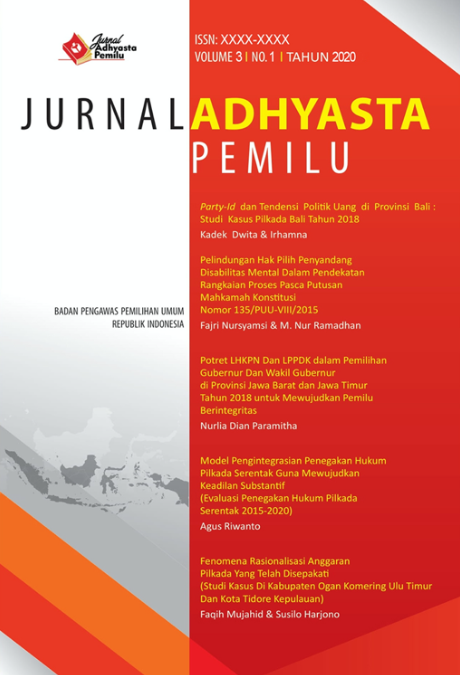Model Pengintegrasian Penegakan Hukum Pilkada Serentak Guna Mewujudkan Keadilan Substantif (Evaluasi Penegakan Hukum Pilkada Serentak 2015-2020)
DOI:
https://doi.org/10.55108/jap.v3i1.30Kata Kunci:
integration, law enforcement, substantive justice and local electionsAbstrak
This research will examine and explore the evaluation of law enforcement practices in the 2015-2020 Concurrent Elections through various doors (justice in many rooms), namely Election Supervisory Board Province/Regency/City, State Administrative Court, District Court, Honorary Board of Election Organizers and Constitutional Court. The result triggers legal uncertainty and is oriented towards procedural fairness rather than substantive justice. This research is normative legal research. Research approach used is the principle of law, legislation, and conceptual. Data collection techniques are carried out using the library study method. Technical data analysis using hermeneutic methods, namely describing objectively and systematically the content of norms and practices interactively. In the future (ius costituendum) is needed integration (one roof system) in the enforcement of electoral law in order to achieve the ideals of substantive justice. The operationalization of this idea is to redesign the electoral law enforcement system through the revitalization of Election Supervisory Board current function as a semi-judicial Judicial Settlement Agency. Election Supervisory Board authority to complete cases of administrative violations, violations of the electoral process, and a code of conduct whose rulings are final and binding. While the dispute of election results is resolved through the Supreme Court in accordance with the provisions of Article 24 of the 1945 Constitution and Article 157 Paragraph (1) of Law Number 10 of 2016 concerning the Election of Governors, Regents and Mayors. Election Supervisory Board authority is designed to focus more on law enforcement with administrative sanctions instead of criminal.
Unduhan
Unduhan
Diterbitkan
Cara Mengutip
Terbitan
Bagian
Lisensi
Hak Cipta (c) 2020 Agus Riwanto

Artikel ini berlisensi Creative Commons Attribution 4.0 International License.



